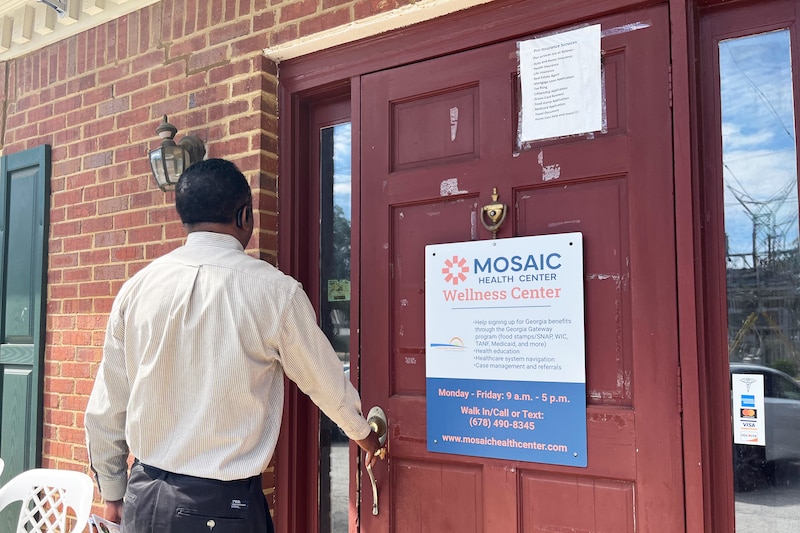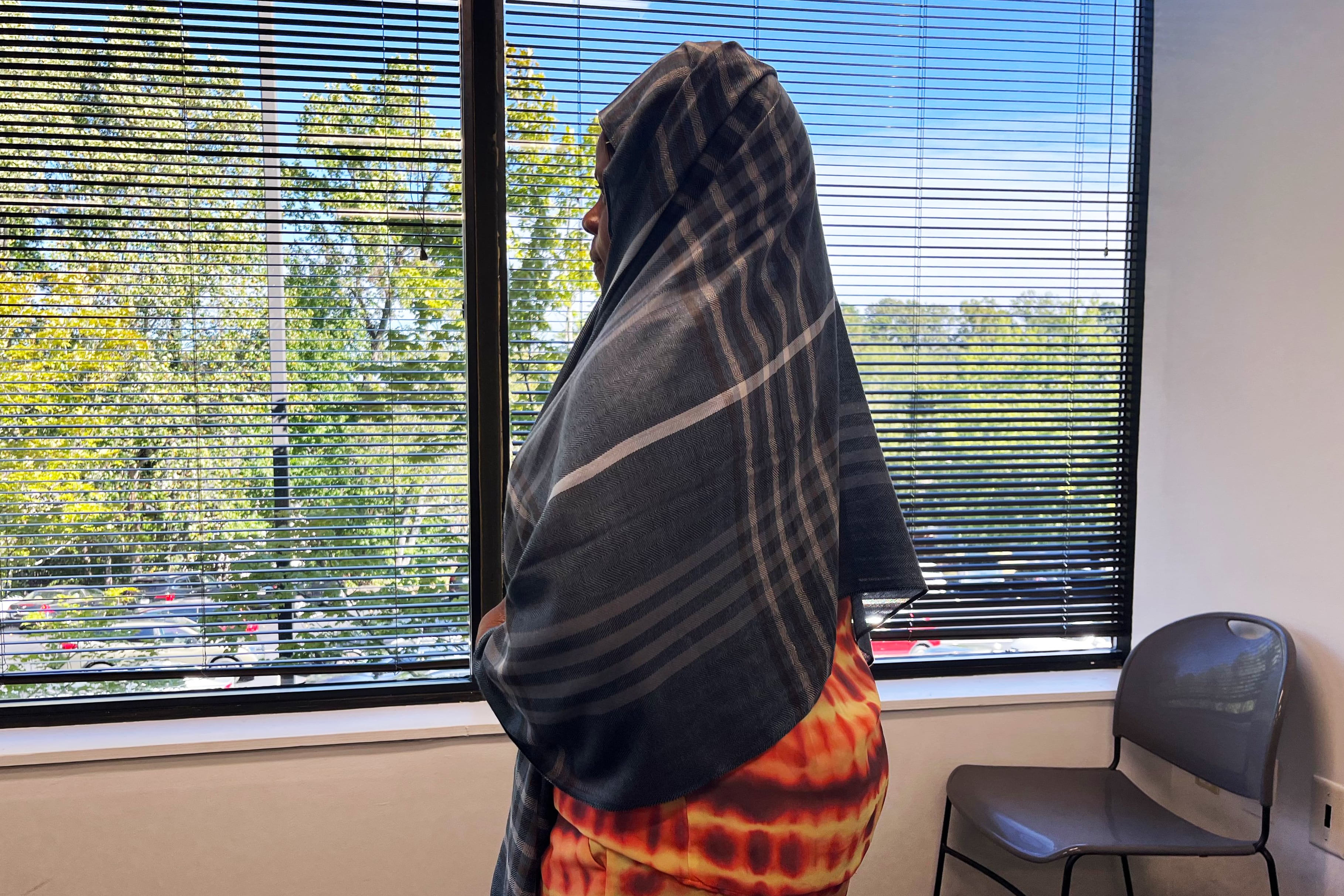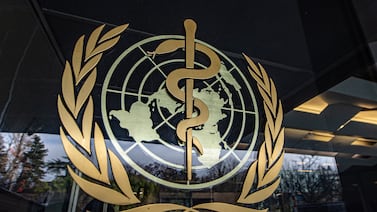Public health, explained: Sign up to receive Healthbeat’s free national newsletter here.
CLARKSTON, Ga. — After fleeing the war-torn Democratic Republic of Congo, Antoinette landed in the Atlanta area last November and began to find her footing with federal help.
Separated from her adult children and grieving her husband’s death in the war, she started a job packing boxes in a warehouse, making just enough to cover rent for her own apartment and bills.
Antoinette has been relying on the Supplemental Nutrition Assistance Program, formerly known as food stamps, for her weekly grocery trips.
But now, just as life is starting to stabilize, she will have to deal with a new setback.
President Donald Trump’s massive budget law, which Republicans call the One Big Beautiful Bill Act, slashes $187 billion — or nearly 20% — from the federal budget for SNAP through 2034. And separate from any temporary SNAP stoppages due to the federal shutdown, the law cuts off access completely for refugees and other immigrant groups in the country lawfully. The change was slated to take effect immediately when the law was signed in July, but states are still awaiting federal guidance on when to stop or phase it out.
For Antoinette, 51, who did not want her last name used for fear of deportation and likely persecution in her native country, the loss of food aid is dire.
“I would not have the means to buy food,” she said in French through a translator. “How am I going to manage?”
Throughout its history, the United States has admitted into the country refugees like Antoinette, people who have been persecuted, or fear persecution, in their homelands due to race, religion, nationality, political opinions, or membership in a particular social group. These legal immigrants typically face an in-depth vetting process that can start years before they set foot on U.S. soil.
Once they arrive — often with little or no means — the federal government provides resources such as financial assistance, Medicaid, and SNAP, outreach that has typically garnered bipartisan support. Now the Trump administration has pulled back the country’s decades-long support for refugee communities.
The budget law, which funds several of the president’s priorities, including tax cuts to wealthy Americans and border security, revokes refugees’ access to Medicaid, the state-federal health insurance program for people with low incomes or disabilities, starting in October 2026.
But one of the first provisions to take effect under the law removes SNAP eligibility for most refugees, asylum seekers, trafficking and domestic violence victims, and other legal immigrants. About 90,000 people will lose SNAP in an average month as a result of the new restrictions narrowing which noncitizens can access the program, according to the Congressional Budget Office.
“It doesn’t get much more basic than food,” said Matthew Soerens, vice president of advocacy and policy at World Relief, a Christian humanitarian organization that supports U.S. refugees.
“Our government invited these people to rebuild their lives in this country with minimum support,” Soerens said. “Taking food away from them is wrong.”
Refugees pay more in taxes than they receive in benefits
The White House and officials at the United States Department of Agriculture did not respond to emails about support for the provision that ends SNAP for refugees in the One Big Beautiful Bill Act.
But Steven Camarota, director of research for the Center for Immigration Studies, which advocates for reduced levels of immigration to the United States, said cuts to SNAP eligibility are reasonable because foreign-born people and their young children disproportionately use public benefits.
Still, Camarota said, the refugee population is different from other immigrant groups. “I don’t know that this would be the population I would start with,” Camarota said. “It’s a relatively small population of people that we generally accept have a lot of need.”
Federal, state, and local spending on refugees and asylum seekers, including food, health care, education, and other expenses, totaled $457.2 billion from 2005 to 2019, according to a February 2024 report from the Department of Health and Human Services. During that time, 21% of refugees and asylum seekers received SNAP benefits, compared with 15% of all U.S. residents.
In addition to the budget law’s SNAP changes, financial assistance given to people entering the United States by the Office of Refugee Resettlement, a part of HHS, has been cut from one year to four months.
The HHS report also found that despite the initial costs of caring for refugees and asylees, this community contributed $123.8 billion more to federal, state, and local governments through taxes than they received in public benefits over the 15 years.
It’s in the country’s best interest to continue to support them, said Krish O’Mara Vignarajah, president and CEO of Global Refuge, a nonprofit refugee resettlement agency.
“This is not what we should think about as a handout,” she said. “We know that when we support them initially, they go on to not just survive but thrive.”

Food is medicine
Food insecurity can have lifelong physical and mental health consequences for people who have already faced years of instability before coming to the United States, said Andrew Kim, co-founder of Ethnē Health, a community health clinic in Clarkston, an Atlanta suburb that is home to thousands of refugees.
Noncitizens affected by the new law would have received, on average, $210 a month within the next decade, according to the CBO. Without SNAP funds, many refugees and their families might skip meals and switch to lower-quality, inexpensive options, leading to chronic health concerns such as obesity and insulin resistance, and potentially worsening already serious mental health conditions, he said.
After her husband was killed in the Democratic Republic of Congo, Antoinette said, she became separated from all seven of her children. The youngest is 19. She still isn’t sure where they are. She misses them but is determined to build a new life for herself. For her, resources like SNAP are critical.
From the conference room of New American Pathways, the nonprofit that helped her enroll in benefits, Antoinette stared straight ahead, stone-faced, when asked about how the cuts would affect her.
Will she shop less? Will she eat fewer fruits and vegetables, and less meat? Will she skip meals?
“Oui,” she replied to each question, using the French for “yes.”
Since arriving in the United States last year from Ethiopia with his wife and two teen daughters, Lukas, 61, has been addressing diabetes-related complications, such as blurry vision, headaches, and trouble sleeping. SNAP benefits allow him and his family to afford fresh vegetables like spinach and broccoli, according to Lilly Tenaw, the nurse practitioner who treats Lukas and helped translate his interview.
His blood sugar is now at a safer level, he said proudly after a class at Mosaic Health Center, a community clinic in Clarkston, where he learned to make lentil soup and balance his diet.
“The assistance gives us hope and encourages us to see life in a positive way,” he said in Amharic through a translator. Lukas wanted to use only his family name because he had been jailed and faced persecution in Ethiopia, and now worries about jeopardizing his ability to get permanent residency in the United States.
Hunger and poor nutrition can lower productivity and make it hard for people to find and keep jobs, said Valerie Lacarte, a senior policy analyst at the Migration Policy Institute.
“It could affect the labor market,” she said. “It’s bleak.”
More SNAP cuts are coming
While the Trump administration ended SNAP for refugees effective immediately, the change has created uncertainty for those who provide assistance.
State officials in Texas and California, which receive the most refugees among states, and in Georgia told KFF Health News that the USDA, which runs the program, has yet to issue guidance on whether they should stop providing SNAP on a specific date or phase it out.
And it’s not just refugees who are affected.
Nearly 42 million people receive SNAP benefits, according to the USDA. The nonpartisan Congressional Budget Office estimates that, within the next decade, more than 3 million people will lose monthly food dollars because of planned changes — such as an extension of work requirements to more people and a shift in costs from the federal government to the states.
In September, the administration ended a key report that regularly measured food insecurity among all U.S. households, making it harder to assess the toll of the SNAP cuts.
The USDA also posted on its website that no benefits would be issued for anyone starting Nov. 1 because of the federal shutdown, blaming Senate Democrats. The Trump administration has refused to release emergency funding — as past administrations have done during shutdowns — so that states can continue issuing benefits while congressional leaders work out a budget deal. A coalition of attorneys general and governors from 25 states and the District of Columbia filed a lawsuit on Tuesday contesting the administration’s decision.
Cuts to SNAP will ripple through local grocery stores and farms, stretching the resources of charity organizations and local governments, said Ted Terry, a DeKalb County commissioner and former mayor of Clarkston.
“It’s just the whole ecosystem that has been in place for 40 years completely being disrupted,” he said.
Muzhda Oriakhil, senior community engagement manager at Friends of Refugees, an Atlanta-area nonprofit that helps refugees resettle, said her group and others are scrambling to provide temporary food assistance for refugee families. But charity organizations, food banks, and other nonprofit groups cannot make up for the loss of billions of federal dollars that help families pay for food.
“A lot of families, they may starve,” she said.
This story was originally published at KFF Health News, Healthbeat’s national reporting partner.






